- Clone
- A15128A (See other available formats)
- Regulatory Status
- RUO
- Other Names
- Adipogenesis Inhibitory Factor (AGIF)
- Isotype
- Mouse IgG2a, κ
- Ave. Rating
- Submit a Review
- Product Citations
- publications
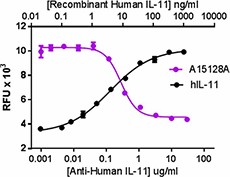
-

Recombinant human IL-11 induces the proliferation of 7TD1 cells in a dose dependent manner (black circles). Ultra-LEAFâ„¢ purified anti-human IL-11 antibody (clone A15128A, purple circles) neutralizes the 7TD1 cell proliferation induced by recombinant human IL-11 (100 ng/mL). The ND50 = 0.2 – 0.8 µg/mL.
| Cat # | Size | Price | Quantity Check Availability | Save | ||
|---|---|---|---|---|---|---|
| 694203 | 100 µg | 216€ | ||||
| 694204 | 1 mg | 572€ | ||||
IL-11, a member of the IL-6 family of cytokines, exerts a wide range of biological effects on various cell types including hematopoietic cells, hepatocytes, adipocytes, neurons, and osteoblasts. IL-11 works synergistically with other growth factors including SCF, IL-4, IL-3, IL-7, IL-12, IL-13, and GM-CSF to stimulate the proliferation of cells from several hematopoietic lineages. Binding of IL-11 to IL-11 receptor (IL-11R) induces membrane bound gp130 homodimerization and triggers STAT3 phosphorylation by JAK. IL-11 shares the common receptor subunit gp130 with IL-6, IL-27, LIF, OSM, CNTF, CT-1, CLC, and NP. Female mice deficient in IL-11R revealed an important role for IL-11 in embryonic implantation. In addition, IL-11 shows anti-inflammatory activity in models of inflammatory bowel disease, chemotherapy induced oral mucositis, and inflammatory arthritis. IL-11 and IL-13 are highly expressed in asthmatic airways (Th2 response), and IL-11 can inhibit Th1 responses and inhibits the production of Th1 cytokines such as IL-12 and shifts inflammation in Th2 direction. Elevated IL-11 expression is associated with tumor grade and invasion in gastric cancer. Recombinant human IL-11 has been clinically approved to improve platelet recovery after chemotherapy-induced thrombocytopenia.
Product DetailsProduct Details
- Verified Reactivity
- Human
- Antibody Type
- Monoclonal
- Host Species
- Mouse
- Immunogen
- Recombinant human IL-11.
- Formulation
- Phosphate-buffered solution, pH 7.2.
- Preparation
- The antibody was purified by affinity chromatography.
- Concentration
- The antibody is bottled at the concentration indicated on the vial, typically between 2 mg/mL and 3 mg/mL. Older lots may have also been bottled at 1 mg/mL. To obtain lot-specific concentration and expiration, please enter the lot number in our Certificate of Analysis online tool.
- Storage & Handling
- The antibody solution should be stored undiluted between 2°C and 8°C.
- Application
-
Neut - Quality tested
- Recommended Usage
-
Each lot of this antibody is quality control tested by neutralizing activity. The ND50 is 0.2 – 0.8 µg/mL. It is recommended that the reagent be titrated for optimal performance for each application.
- RRID
-
AB_2650725 (BioLegend Cat. No. 694203)
AB_2650725 (BioLegend Cat. No. 694204)
Antigen Details
- Structure
- Cytokine
- Distribution
-
Epithelial, endothelial, keratinocytes, stromal, neuronal, fibroblasts, osteoclasts, and bone marrow stromal cells.
- Function
- IL-11 plays important roles in hemopoiesis, thrombopoiesis, megakaryocytopoiesis, and bone resorption; It regulates macrophage differentiation and confers mucosal protection after chemotherapy and radiation therapy.
- Interaction
- Hematopoietic cells, hepatocytes, adipocytes, neurons, osteoblasts, fibroblasts, and gastrointestinal epithelial cells.
- Ligand/Receptor
- Membrane bound or soluble IL-11Rα heterodimerize with gp130β.
- Cell Type
- Endothelial cells, Epithelial cells, Fibroblasts, Osteoclasts
- Biology Area
- Cell Biology
- Molecular Family
- Cytokines/Chemokines
- Antigen References
-
1. Putoczki T and Ernst M. 2010. J. Leuko. Biol. 88 1109.
2. Wilde MI and Faulds D. 1998. BioDrugs 10:159.
3. Barton VA, et al. 2000. J. Biol. Chem. 275:36197.
4. Robb L, et al. 1998. Nat. Med. 4:303.
5. Lemoli RM, et al. 1995. Br. J. Haematol. 91:319.
6. Elias JA, et al. 1994. J. Biol. Chem. 269:22261.
7. Chen Q, et al. 2005. J. Immunol. 174:2305. - Gene ID
- 3589 View all products for this Gene ID
- UniProt
- View information about IL-11 on UniProt.org
Related FAQs
- Do you guarantee that your antibodies are totally pathogen free?
-
BioLegend does not test for pathogens in-house aside from the GoInVivo™ product line. However, upon request, this can be tested on a custom basis with an outside, independent laboratory.
- Does BioLegend test each Ultra-LEAF™ antibody by functional assay?
-
No, BioLegend does not test Ultra-LEAF™ antibodies by functional assays unless otherwise indicated. Due to the possible complexities and variations of uses of biofunctional antibodies in different assays and because of the large product portfolio, BioLegend does not currently perform functional assays as a routine QC for the antibodies. However, we do provide references in which the antibodies were used for functional assays and we do perform QC to verify the specificity and quality of the antibody based on our strict specification criteria.
- Does BioLegend test each Ultra-LEAF™ antibody for potential pathogens?
-
No, BioLegend does not test for pathogens in-house unless otherwise indicated. However, we can recommend an outside vendor to perform this testing as needed.
- Have you tested this Ultra-LEAF™ antibody for in vivo or in vitro applications?
-
We don't test our antibodies for in vivo or in vitro applications unless otherwise indicated. Depending on the product, the TDS may describe literature supporting usage of a particular product for bioassay. It may be best to further consult the literature to find clone specific information.
Other Formats
View All IL-11 Reagents Request Custom Conjugation| Description | Clone | Applications |
|---|---|---|
| Ultra-LEAF™ Purified anti-human IL-11 | A15128A | Neut |
Customers Also Purchased
Compare Data Across All Formats
This data display is provided for general comparisons between formats.
Your actual data may vary due to variations in samples, target cells, instruments and their settings, staining conditions, and other factors.
If you need assistance with selecting the best format contact our expert technical support team.
-
Ultra-LEAF™ Purified anti-human IL-11
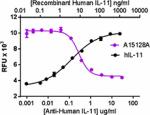
Recombinant human IL-11 induces the proliferation of 7TD1 ce...

 Login / Register
Login / Register 





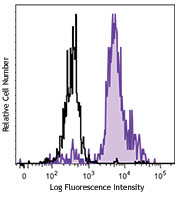
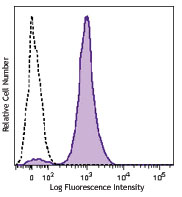
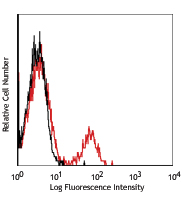
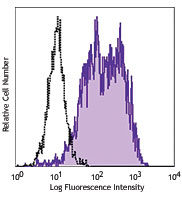



Follow Us